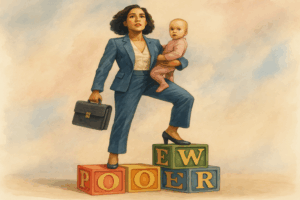Jun 3, 2025
Kanter
After 20 years on LinkedIn, I have over 35,000 followers (as of this writing) on the platform. When I made a splashy, high-performing announcement that I’d started an Instagram account (@santaluciasf – at the persistent nudging of the PR team for my major novel releasing October 2025), only about 40 people followed me over. Forty. Out of 35,000+. That statistic—deceptively small, but profoundly telling—encapsulates the mirage we’re chasing in the social media desert: the illusion of popularity and mattering.
Now, I’ll say this about Insta: it’s a FUN playground. But …
You can spend hours crafting dazzling, meaningful content vibes (all time during which you’re not, say, reading a book or hiking a trail with your dog, mind you):
🎞️ Reels that sizzle with on-trend music, passion, and movement.
📚 Stories threaded with authenticity and all the feels.
📋 Posts that tap into the very pulse of cultural and personal resonance.
And still—crickets 🦗
No matter how polished your output, the system is rigged—like vanity sizing in the fashion industry: flattering on the surface to encourage that ApplePay tap, but without changing the underlying muffin-top reality. Visibility has become transactional. Unless you pay to play—boosting posts or running bots behind the curtain—your reach is throttled by a merciless algorithm designed to feed desperation, dopamine, and the lottery ticket mindset.
🎰 Look, I’m hardly the first to notice that social media has long ceased being a tool for connection. It’s a casino slot machine. And the house always wins.
Even when you do fork over “protection” funds from your own till, you’re paying for the privilege of being trickedinto thinking you’re popular, important, sought-after, loved … adored. That you matter to those followers—that you’re even on their mind.
You don’t. And you’re not. They’re focused on themselves and the time they’re also spending creating ‘content’ they hope will magically get the right person’s attention. Many may be following you because they view you as their revenue stream or want to tailgate your energy or accomplishments to boost their visibility. Sorry to break it to you, Petunia, but people generally act out of self-interest–even if their DMs couch their motives in sneaky, reciprocally-rewarding looking words like “collaborating.”
What’s also happening? The lining of an algorithmic mastermind (some might say mob boss)’s already endlessly deep mid-wash, straight-leg, no-fuss dad jeans pockets that say (if jeans could talk), “I disrupted fashion by opting out.” Every tap to boost a Reel is a fresh kill tossed into Zuckerberg’s eagle’s nest. And what’s the payout? A dripline of illusion straight to your ego’s vein—fast, addictive, and depressingly effective:
👍 The faint glow of a few more likes.
🤖 A trickle of new followers (who may not even be human).
✏️ Maybe an empty comment or two (“Spot on!” “Great post!” “This is fire!” — anyone?).
We’re told that visibility = value. That engagement = impact.
But often—just like with actual bestselling books (think: Lessons in Chemistry or a Reese’s Book Club pick)—what it really signals is a big budget (and/or a well-timed influencer anointing). See above: “slot machine,” Vegas edition. Popularity can be bought, and influence, it turns out, is often a rented suit.
And here’s the kicker: even when you comment on the posts of influencers with huge followings, they’re likely not the ones reading it. Think they’ll notice you? Think again, Princess Buttercup. They’ve outsourced their community engagement to social media managers who charge thousands per month to maintain the performance of authenticity. Hell, even people who market themselves as public figures or influencers (but really aren’t) deploy this strategy.
People. You. Personally. Know. And have spent time with.
Your thoughtful reply? It’s algorithmic fodder, not a genuine connection or strategic mechanism to get noticed. Also, notice whether they reciprocate by following, reacting, or commenting on your stuff (even if they do, it’s not them in many instances. It’s a stunt double from their MarCom team, not a decision-maker).
🧐 So I ask myself: why feed this machine? Why participate at all?
Because, well, it’s kinda fascinating! I admit it. And as a Gen X’er who’s becoming less relevant by the minute, I try to lurk at the margins of awareness about how the world works. Also, there’s still a sliver of strategic value—when deployed with care. A post can help you reach a niche audience in a new market. It might put your work in front of a gatekeeper, a podcast host, or an editor who wouldn’t have seen it otherwise. In rare cases, it can spark a cascade of organic momentum. But these are extreme exceptions—like how a 19-year old justifies their withdrawal from college to their parents by pointing to Zuckerberg himself. Or an indie author who says, “Well, look what happened with The Martian.”
The real work—the work that matters—isn’t happening in the comments. It’s in the craft:
📖 The exquisitely (and organically—ahem) written book that took years to chisel and polish, and drove you to the precipice of bona fide madness.
🚀 The launch–mine will be at the Palace Hotel in SF this fall. 🎉
📣 The voice you refine when no one’s watching or “reacting.”
True visibility isn’t in the boost. That’s an evanescent hologram which dissolves like the Wicked Witch made of brown sugar–especially if some celebrity sneezed around the same time you spent money that could have gone into your 401k account to boost a post (and buy Zuckerberg a week of Starbucks cold brews).
It starts with substance.
📈 So no, I won’t confuse algorithmic reach with artistic or intellectual worth. Nor is it my business plan. I won’t pretend that social media engagement is anything more than an insidious and finely tuned illusion. And I certainly won’t measure my significance by the number of hearts on a screen.
🌈 I think I’ll let others chase the metrics. I hope they find the pot of gold at the end of that chimera so they can, at the very least, break even. Maybe even boost that retirement account, after all.
I’ll be here, building gravity. And over there on the IG carousel too—@santaluciasf—having fun, however modest my following may be. I don’t pay anyone to pretend to be me, and I do all my own posts using just the native app and a free account. Think of it as my Zuckerberg version of the grey tee and Birkenstocks 👕
Why? Because my self-determination is bigger than Zuckerberg’s B-nut.
And because gravity? It pulls more than smoke, mirrors, and a man behind a silicon curtain. And it always will.
About Me: I am S. Lucia Kanter St. Amour, a joyful, sassy, organic cross-genre writer, attorney, law professor, and VP Emerita of UN Women San Francisco. I’m the author of five books, with my latest dual timeline women’s historical fiction novel, The Covert Buccaneer, releasing Fall 2025.
May 9, 2025

One Mothers’ Day, my sons made me a messy fruit salad. Strawberries, bananas, blueberries—even a sprig of mint. They served it with burnt toast, silly grins, sticky fingers, and the kind of pride that made me tear up. It was sweet. It was perfect.
And it had little to do with what I actually needed.
Mothers’ Day is sold to us as a celebration—but we still have to work. It’s not actually a day off. After the fruit salad came the dishes. The laundry. The meltdown over a missing shoe. The screen-time negotiation. The looming bills. The splinter that required tweezers and tweaked patience. The code called “summer break” to crack. The groceries.
I didn’t need brunch. I needed backup.
Like so many mothers, I wasn’t just raising children—I was holding up the scaffolding of our family. Quietly. Invisibly. While caregiving for a special needs child. While holding down a so-called real job. While quietly crying in the shower. While trying not to collapse under the weight of it all.
In this country, while mothers are vaulted on social media, we’re penalized in reality. We’re romanticized in cards, but rarely supported in policy. We’re handed mimosas when what we need is paid leave. Affordable childcare. Job protection. For our labor—the emotional, physical, invisible, economy-driving kind—to be compensated and counted.
We need a system that doesn’t punish us for reproducing. Or con us with talk of $5,000 “baby bonuses,” as if a signing bonus could offset the physical and financial cost of raising a child. (In 2020, that figure was $286,000 per child from birth to age 17, per the HBS Caregiver Economy Report.) And it certainly doesn’t cover the opportunity cost of stepping off a career path because you had no choice.
Our organizations and economy can’t afford to keep losing women. The math is brutal:
🧮 70% of U.S. mothers are in the workforce.
🧮 They contribute, on average, 40% of household income. In the poorest families, that jumps to 86%.
🧮 And still, women pay a 4% wage penalty per child.
🧮 Men? They get a 6% raise—for the same baby.
🧮 This gap widens with each child and is never recovered.
🧮 Meanwhile, U.S. companies lose $35 billion annually by failing to support caregivers (82% of whom are women).
Mothers are drivers of the economy. There’s serious bank in taking mothers seriously.
But we don’t.
We tell mothers to lean in, but don’t meet them with a net. We urge them to break glass ceilings—then leave them barefoot in the shards.
And historically? We’ve treated caregiving as a private burden, not a shared responsibility. Even during COVID lockdowns—when both parents were home—“[t]here was a lot more domestic labor to do. More dishes piled up, with more needy children underfoot. But even when men worked from home, women still handled more of the work. Eight in 10 mothers said they managed remote schooling (fathers overestimated their contribution).”—The New York Times, March 11, 2025.
🍓 Oh—but wait. Those strawberries are dipped in chocolate?
Still.
Imagine a society that stops performing appreciation and starts practicing it—in budgets, in policy, in daily life:
💸 that pays her what she’s worth.
📈 that protects her job and promotion pathways.
🏛 that passes laws that support her—not trap her.
🧮 that counts her labor as labor—and chips in.
We trail every. other. industrialized. nation. when it comes to how we treat mothers. If we’re going to stage this annual Prosecco-fueled theater, let’s at least drop the curtain and speak the truth:
Brunch has class. But equity cuts glass. Still, we must move beyond ideology to materiality if we want to stem the hemorrhaging of protections for women and mothers. (For more on that, read my article “Indispensable.”)
And if you know a single mother? Don’t just thank her. Back her. Believe her. Elevate her. Every flipping day.
Honoring mothers is more than fizzy. It’s fierce.
S. Lucia Kanter St. Amour is a joyful organic cross-genre writer, attorney, law professor, and VP Emerita of UN Women San Francisco. She is the author of five books, with her latest women’s historical fiction novel, The Covert Buccaneer, releasing Fall 2025.
Aug 21, 2023

The Cringey Superpower Women Aren’t Using (And How to get your caped groove on – read more here)!
Aug 1, 2023

I know what you’re wondering. What, above all else, keeps you up at night: how shoe fashion and the Barbie movie serve as vessels to comment on the caregiver economy, the labor force, gender pay gap, and women in negotiation? Read my article here.
Feb 7, 2023
People are writing to me asking why I haven’t added to my blog since September 2022. Two reasons:
(1) I am producing so much content with print, audio and video interviews of me about my book; and posted sparkling content on LinkedIn (which are mini blogs, really) until the end of 2022. I don’t feel the need to continue filling space with words here; and
(2) I want my September 14, 2022 post to stay at the top. Because it’s important to out such behavior.
That is all. Now go be a Force of Good! 🦸🏻♀️
Sep 14, 2022

On Monday September 12, 2022, I posted the following on LinkedIn. 2 days later, it was removed by LinkedIn and I received a warning that it violated community standards (with no explanation of what the violation was. Mind you, my post didn’t even mention some of the more extreme behaviors: the written group rape threat against me; the corporate malfeasance; the widespread libel; the guy who put up a windshield sized banner of himself naked in the bathtub; emails saying I was like “Mom in the room making sure everyone plays nice” for simply attending meetings to inform myself of corporate operations; the fact that invoices, ballots and surveys were sent only to male account-holders and not the women; and so much more). So, I posted this image of LinkedIn’s reprimand of me, which generated quite a bit of traffic and requests by people to see the content of the original post. Here is that content of the original post:
What was it Bruce Banner said? “You wouldn’t like me when I’m angry . . .”
They labeled me a Disruptor. Well, WATCH ME LEAN INTO THAT 🦸🏻♀️
The year was 2021. I’d been practically begged to be President/CEO of a very male dominated sports organization (picture the last bastion of White male privilege in your mind’s eye – yep, that’s the place!) and I ended up being formally reprimanded by a secretly assembled conduct committee for . . .
(really, prepare to react with shock & dismay at my atrocious behavior) . . .
once (allegedly) dropping the F-bomb in a board meeting. (click here to watch scene. 2 minutes to watch. “The” moment is about a minute and 5 seconds in)
GREAT CUPCAKES!
And here’s what definitely NEVER happened at that place by the men with no repercussions:
✓dropping F-bombs in meetings every 6 minutes or so (“just locker room talk”)
✓drinking so excessively that they whipped “it” out and urinated on the wall (“boys will be boys,” 🤷🏻♀️)
✓inebriation to the point of passing out in the parking lot (“hey, it happens!”)
✓breaking into a fight and punching a hole in a manager’s wall (no comment)
✓arrested and jailed overnight for public drunk & disorderly conduct and then boasting vocally about it within the organization (he’s still on the board. no reprimand. Same dude as naked in the bathtub banner referenced above)
✓referencing “going home and getting my gun” if the women didn’t quit being so “entitled” with their demands of equitable treatment (also still on the board!)
✓plying a 17-year old female employee with tequila at a men’s only event
✓(I’ll need to do this in installments because the list of things definitely an invention of my overactive imagination by others in leadership exceeds the character limit)
But ONE woman allegedly drops ONE F-bomb in ONE meeting and it’s the end of civilization as we know it. AND THEN THEY OUSTED ME.
(Is this the “whole story?” Um . . . not even close, sports fans!)
Yes. It’s true. If you’ve been wondering who’s responsible for the degradation of humanity: it’s ME! 👿
I must have deserved it, right? (And do you wonder what caused me to (allegedly) drop said F-bomb . . .?)
Can I get a “Oh HELL NO, Lucia!” in the comments? (It really deserves an F-bomb, but I wouldn’t want you to be reprimanded by LinkedIn)
Zero #allyship. Bullying wasn’t just tolerated; it was encouraged.
NOW FOR THE PUNCHLINE: Without their ousting me, I wouldn’t now have my role with UN Women; wouldn’t have started my podcast; wouldn’t have written my SEXY, SPLASHY, SMART un-put-downable Robert Cialdini-endorsed / NPR interviewed book about to release (see chapter 15: Negotiating with Bullies).
Sneak peek here: https://lnkd.in/ghcQQiP2
They thought I wouldn’t survive the storm? I AM THE STORM, FELLAS!
They really should have played nicer (see chapters 2 and 15). 😠
That letter of reprimand is a badge of honor. If you’re someone to help display it on a billboard on the CA-101 freeway, DM me.
🎤drop. Before I (allegedly) drop another F-bomb . . .





